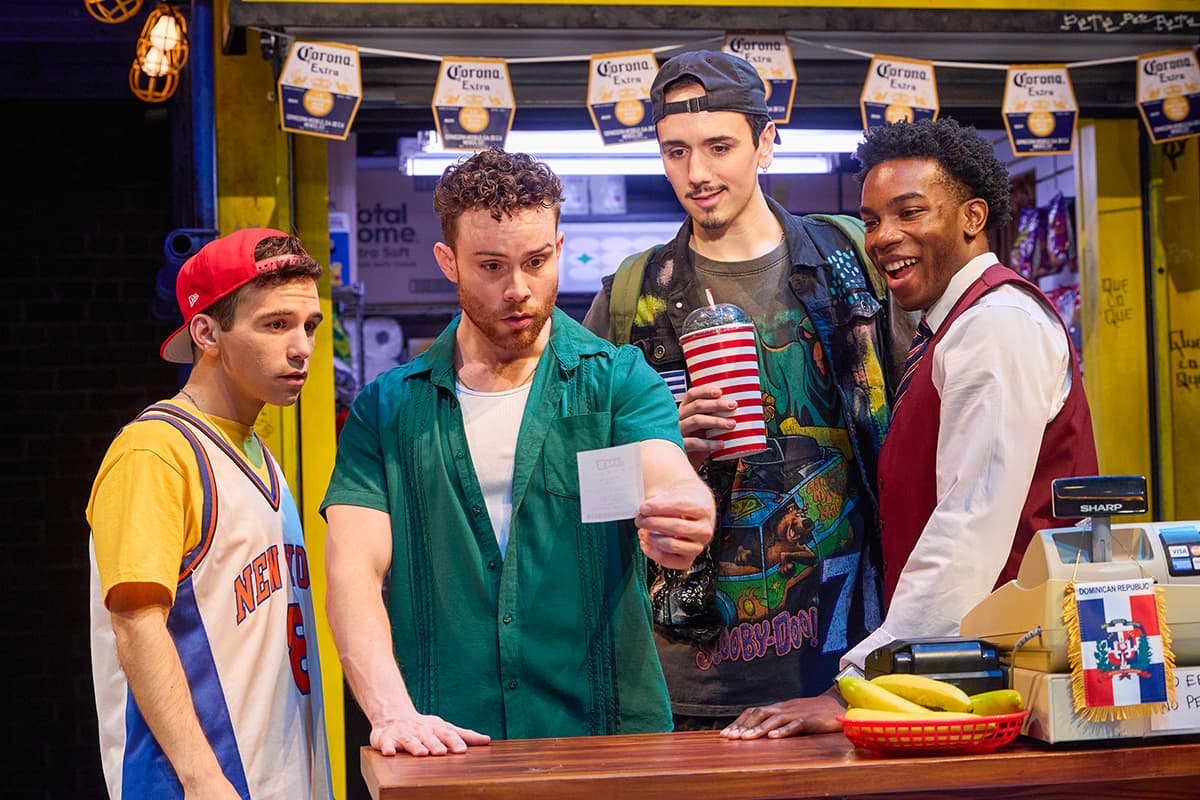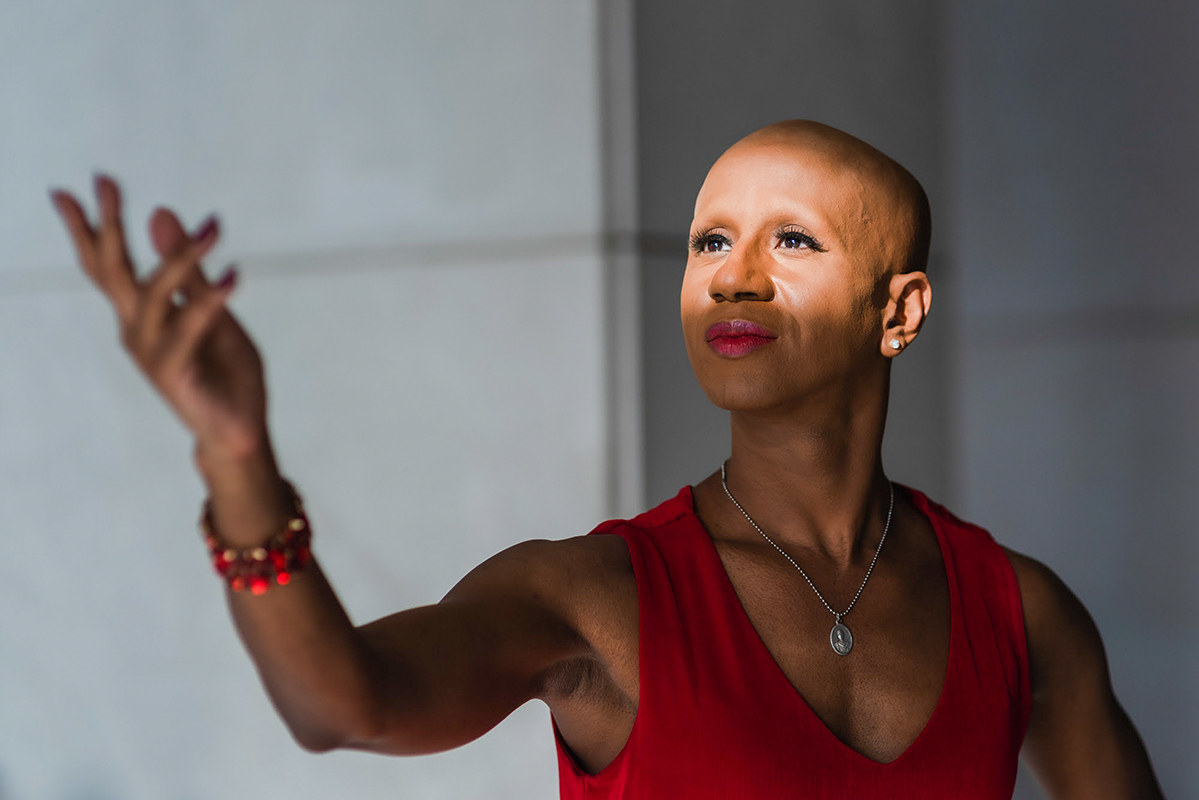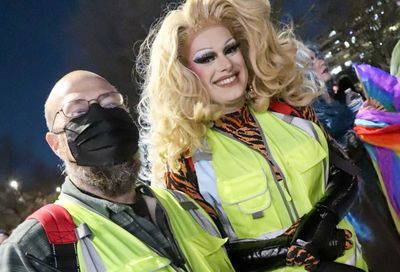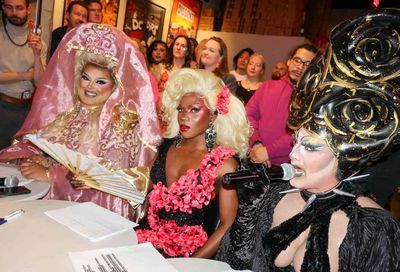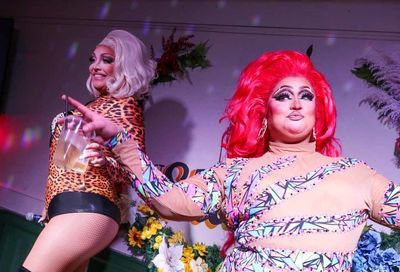Signature Style
Eric Schaeffer turned his passion for musicals into Arlington's theatrical crown jewel
Ask Eric Schaeffer what he loves most about musicals and here is the answer you get:
“I just love how musicals are about big emotions, how when someone can’t express it in words anymore, that’s when they go into song. I love those big emotions, I love that sense of going to escape to a place where music takes over.”
You could say musicals have taken over this 44-year-old former graphic-artist’s life, that song and dance have become his defining legacy.
 Eric Schaeffer |
As the man in charge of Arlington’s Signature Theatre, Schaeffer has overseen 17 years of unprecedented critical success and growth, not just for the theater — which recently moved into a glorious new building in Shirlington, and comes complete with two houses, The Max and The Ark, as well as a vast lobby that simply takes your breath away — but for his rock-solid stature as one of the country’s preeminent directors of musical theater. Schaeffer is especially noted for his fresh and inventive takes on the works of Stephen Sondheim and John Kander and Fred Ebb, shows that, like the man himself, display a fierce undercurrent of intelligence and adventure. And Shaeffer is equally comfortable with big, boisterous crowd-pleasers. To that end, last year he helmed the Kennedy Center revival of Jerry Herman’s Mame, starring Christine Baranski.
Schaeffer hasn’t so much as reinvented the musical wheel rather than, whenever possible, spun it in a different direction. And despite his work with legends like Sondheim, he’s not beyond developing new talent. “It’s my job,” he says frankly. Witness Matt Connor, whose sumptuous and haunting ode to Edgar Allen Poe, Nevermore, was developed first by Signature and is now beginning to find a life in regional theaters across the country.
This year has been a banner year for Schaeffer, a native of Fleetwood, Pa., who came to Washington in the late ’80s to spend a couple years working in graphic design and wound up creating what would become Arlington’s first major professional theater company.
Like any director, Schaeffer has had his hits and misses, but this year has been especially fertile, with four consecutive hit musicals in a row: Into the Woods, Saving Aimee, the American premiere of The Witches of Eastwick and, at Ford’s Theatre, the premiere of Meet John Doe.
“Everything just happened back to back,” says Schaeffer, relaxing in his spacious office in Signature’s new building, featuring a view of the neighboring Shirlington Library and a mass of condominiums under construction. “That’s not always ideal because you feel like you need to recharge your batteries. But I’m lucky because they were all such crazy, different shows that I was really passionate about.”
Schaeffer keeps his circuits charged by painting. He created a striking piece of work for the theater’s office hallways — a three-panel abstract with the word Signature crafted out of the names of everyone who has thus far worked with the company. The painting gets right to the heart of this soft-spoken, unassuming man who has, with passion, drive and determination, succeeded beyond his own wildest dreams, who has created a thriving giant of a regional theater company that retains its sense of intimacy, its sense of community, and its singular, signature sense of style.
METRO WEEKLY: Let’s start with the big changes for you and Signature this year. I’m curious how you’ve dealt with moving from your former space, The Garage, into this huge, magnificent new building.
ERIC SCHAEFFER: By the time we left The Garage, I was really ready to go. I’d just felt like we’d outgrown it. There was nothing else we could do in that space. And the space itself wasn’t in great shape. So it was actually great to get over here. The hard thing was when we saw this [finished] building, we realized what it was going to take to run the building. There were things that we didn’t anticipate that came up. We just had to roll with the punches.
MW: Like what?
SCHAEFFER: Like everybody loved the whole idea of having ushers with their clipboards when we were at The Garage. But in the new space it’s a nightmare. You’re getting twice as many people in and it takes longer, so it doesn’t expedite the patrons as fast as it should. So that’s been hard. It was all stuff you figure out. We had to go through that process to figure it out and make all the changes.What’s been great about the space is having three rehearsal rooms and the ability to jump back and forth between scenes and dances or music. We never had that before. The actors love the dressing rooms and the showers and the bathrooms. And they have all this room backstage, including a green room with an entire kitchen. So the working environment for everyone is much better. I think in the end it makes for a much more creative process.
MW: So it changes the product.
SCHAEFFER: Yes. But it also changes the audience’s expectations. I think they walk into this building and their expectations are way higher than walking into [our former space], which is totally understandable. So you feel pressure that you have to deliver a bigger product. But that’s a good thing. It’s what makes us grow as artists.
MW: What’s the best thing about this space so far?
SCHAEFFER: The best thing about this space is that we didn’t get stuck in an existing building, where you have to make the theater work in the real estate within that building. This was built from the ground up. We made the plans for what it was going to be. It gave us much more freedom and let us really do things that we wanted to do.
MW: Most of the major D.C. theaters have undergone or are going through similar renovations or moves to new spaces — Studio, Woolly Mammoth, Round House, the Shakespeare, Arena. It’s interesting that in this relatively short period of time there has been so much development and growth. What do you attribute that to?
SCHAEFFER: I think it’s because audiences are really supportive of the different types of theater that are here. I think Washington is finally waking up and getting a nightlife. I remember people used to say, ”God, this city rolls up at night.” I think that’s totally changing. Washington is not going to sleep at 10 o’clock at night anymore.
MW: I wonder if some of the smaller, emerging theater companies can also look forward to similar growth in the future?
SCHAEFFER: I think so. It just takes time and energy and passion. A lot of people don’t realize how hard it is to produce theater. I think people go, ”Oh, I can do this,” and then they do it for a year and they’re like, ”Oh, it’s too damn hard. I don’t have a life.” I think if the right people are dedicated to it, it will happen. But I think the reality is that people don’t want to work that hard anymore.
MW: What’s unique about your situation is that you’ve pulled this off in Arlington. You did this here, some might say, against all odds. And you did it with some extremely provocative, challenging works.
SCHAEFFER: [Laughs.] The work we sometimes do here is not going to be everyone’s favorite. They’re works you’re not going to bring Grandma to.
MW: And yet you refused to play it safe from the start. And the audience was there and more than willing to go along for the ride. Plays like Poor Super Man and Unidentified Human Remains were not for the prudish.
SCHAEFFER: It’s true. I don’t think we’ve ever apologized for what we did. We were trying to give people a different experience than they ever had before. Some people hated it, some loved it. Even today, some people love it and some hate it, but it makes people leave the theater wanting to talk, to have discussions, to have fights, to have opposing points of view. It’s about making conversation.
MW: You continue to challenge audiences even in the new space with shows like Crave and Nest, both of which played in your smaller, second house, The Ark.
SCHAEFFER: I think it’s important to keep pushing the envelope.
MW: Are you ever surprised by reactions to these more challenging works?
SCHAEFFER: I was surprised at the critics’ reaction to Crave. I knew that was a bold choice to open up The Ark theater, but Sarah Kane is such a provocative playwright. In Europe, she is just lauded and really, really revered. Even in New York City, same thing. Here, what was interesting was that the critics actually went after Sarah Kane’s writing. They didn’t go after the production. They thought [director] Jeremy [Skidmore] did a great job, the cast was terrific, the design was great. They went after the writing. It made me scratch my head, like, ”You don’t get it.” This was a writer who was making us go somewhere that none of us ever go. Whether you liked it or not, you had to appreciate her style of writing and how good it was.
MW: Still, since you staged it in The Ark, I imagine you could afford to take the chance with it.
SCHAEFFER: It’s still a huge risk to do a show in the Ark — it’s a $200,000 risk. So it’s a huge thing. But I think it’s important to challenge our audiences. I don’t want to do the same thing that’s done in community theaters or on Broadway — I want to do new stuff. I look at Crave, and then I look at Nest, which was totally different, and then I look at The Word Begins — a slam poetry piece — which is going to go in The Ark next, and I just go, ”Look at the eclectic mix at what’s going on in there.” It’s just really, really exciting.
MW: Is it worth the risk?
SCHAEFFER: I think it’s worth it. Plus, I think it’s my job to do that. I guess I could take the easy route. And if I took the easy route it would be a lot easier to meet the budget and I wouldn’t have to do extra fundraising and everything else. But is it selling out? Yeah, I think so.
MW: How do you justify the risk when the risk doesn’t pay off?
SCHAEFFER: [Laughs.] Well, you just kind of go, ”Well that one didn’t pay off but the next one will.” Or you hope it will.
Having two theaters lets the audience enjoy something like Witches of Eastwick and then be challenged by something like Nest. And our audiences have said to me, ”It’s so great seeing direct opposites.” Here’s this story about a woman getting hanged in Pennsylvania, and here’s a story about these three women in New England who are just having the time of their lives. It’s great having both those experiences under one roof. Once again, it’s trying to be unpredictable.
MW: Both houses are entirely configurable?
SCHAEFFER: Yes, both are black boxes.
MW: You prefer that?
SCHAEFFER: Absolutely. People say, ”You have to design a set” and I say, ”No, we have to design a theater.” Every time we do a show we’re designing a theater because we’re designing a seat configuration along with the set and how it’s all going to work in that space — the technical requirements, everything. So everything has to move to fit.
MW: As you become accustomed to The Max, will you be able to branch out and do more adventurous seating arrangements?
SCHAEFFER: Oh, yeah, we’ve done three different ones already. Every show, we’re trying to push the boundaries.
MW: What’s the budget on Witches of Eastwick?
SCHAEFFER: [Laughs.] Too much!
MW: But in this case I imagine the risk has probably paid off. This is the American premiere of this show. You directed the show in England.
SCHAEFFER: I did, seven years ago.
MW: Has the show changed much in that time?
SCHAEFFER: We’ve changed the show about 30 percent from the London production. Got rid of three songs, put in three new ones. Changed the structure of it a lot, really fine-tuned it, got the fat out of it. It’s much, much tighter than it was in London. And the tone of it is totally different. In London it was very cartoony, whereas here it’s very sensual and sexy. It walks a very fine line in a much more sexual way here. And it’s much more ”in your face” in a good way.
MW: What was it about the project that initially attracted you?
SCHAEFFER: I love the story. John Updike’s book is really fascinating and I just always thought it would make a really good musical.
MW: You’ve cut the scene where one of the characters regurgitates cherry pits.
SCHAEFFER: It was in there. We did it in London and we did it here for one performance. And then I cut it because it became about the cherry pits and not about the character. And once we cut it, we didn’t miss it. We were like, ”We don’t need it, it’s not about vomit.” There’s a lot of stuff that still comes out of her mouth — tennis balls and feathers and pearls.
MW: You’re known for your work on Sondheim and Kander & Ebb musicals, but you haven’t done much in the way of Andrew Lloyd Webber.
SCHAEFFER: We did Tell Me on a Sunday.
MW: Are there any other of his shows you would consider? I’m taking a wild guess here that we’ll never see an Eric Schaeffer version of Cats.
SCHAEFFER: [Laughs.] No way, never Cats. Not in my lifetime. But I would love to do Aspects of Love. I have an idea of how to do it, and as crazy as it sounds I think it would be really great, so maybe someday.
MW: You continue to work in both the Broadway spectacle world and in the more intimate regional world. How do the two mesh for you?
SCHAEFFER: It’s good because you use different parts of your brain. You end up taking things from the huge shows and using them in the smaller show. You learn to use tools from both sides.
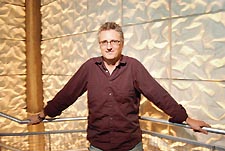 |
MW: Not to mention the fact that working in spectacle helps pay the bills.
SCHAEFFER: Exactly.
MW: When Broadway and London came calling, you didn’t leave Signature. You found a way to maintain your post here and work off site as well. Others might have just made the full career jump. Why did you stay?
SCHAEFFER: I remember talking with Daniel Sullivan when he left Seattle Rep. He went to New York and became a freelance director. I said, ”How is it going?” And he said, ”Eric, I’m now having to shop around shows that I want to do to try to get people and theaters to do them. I’ve never had to do that in my life. I gave up my playground. That was probably one of the worst things I ever did.”
I think if I had to go to someone and say ”I want to do this new musical on Edgar Allen Poe by this composer who’s never written a musical before,” they’d go, ”You’re crazy, get out of here. Forget it. We’re not going to give you $300,000 to put up that show.” Whereas here, everyone embraced Nevermore. They were like, “This is great. Let’s give a local person an opportunity.”
The best shows on Broadway are coming out of the regionals. Spring Awakening, Grey Gardens — those are coming out of the regional theaters. So that’s where the best stuff is happening.
MW: I guess it’s to our benefit that you didn’t just pull up stakes and leave. But I’m also guessing you would have had a hard time leaving. This is your baby.
SCHAEFFER: Oh, I know. It would be hard. When we opened this building, someone said, “How does it feel?” And I said, ”Have you ever had a dream come true? You dream something and you say, ‘Oh, I really want this or I really want to do this’ and you actually get to do it. How many times does that happen in your life?” It doesn’t.
MW: What’s interesting about this building is that it still feels like Signature. It’s vast but inviting. It’s playful and unpretentious, yet stately and impressive.
SCHAEFFER: We tried hard not to let it get pretentious. We wanted to reproduce the spirit and the rawness of The Garage but still have it be hip and feel like it was this energetic place that people would want to come to and hang out. I think we really succeeded at that. We painstakingly took months deciding it all, but it was so worth it. It’s grand but there’s a lot of detail that doesn’t make it feel snotty.
MW: In designing the building, were you much of a control freak?
SCHAEFFER: I think was more of a style freak than a control freak. I think everything has to have a sense of style, a look. That’s what I was a freak about. But I think it’s a good thing. It’s got some zip, it’s got style, you want to go be a part of it.
MW: You’re building an institution.
SCHAEFFER: I hate the word ”institution.” Signature can never be an institution because anytime anyone thinks of themselves as an institution, creatively they’re dead. All of a sudden there’s this whole other monster cloud over you when you say that word. And I’ve said I never wanted Signature to be an institution. I always want it to be this really thriving, now-what-are-they-doing, surprising place. That’s really important to me.
MW: Do you have any current directing plans coming up outside Signature? Any possible Broadway things?
SCHAEFFER: Yes, but I can’t talk about it.
MW: Any thoughts about landing the eventual rights to Spring Awakening?
SCHAEFFER: It’s funny because subscribers say, ”Oh, you’ve got to do Spring Awakening — it’s so Signature.” But it’s going on a national tour and stuff like that. I think it would be interesting to take a show like Rent that has been running for a while and totally re-look at it in a Signature way. I think people would want to rediscover that and not just see the Broadway blueprint of that show.
MW: I’m not a fan of Rent, mainly because Mimi lives at the end. I hate that E.T. moment of her springing back to life.
SCHAEFFER: [Laughs.] Well, maybe we’ll kill her in our production.
MW: That would be a start. You’ve gotten a reputation for helping develop new musical talents.
SCHAEFFER: It’s part of our job here, developing new talent and giving new writers opportunities. I think it’s so important. That’s the only thing lacking in Washington theater. I think smaller companies are doing it, but the bigger companies have to do it more.
MW: Who gave you your first opportunity?
SCHAEFFER: Pat Sheehey at the Source, believe it or not. I started doing sets at the Source. I think the first set I did was How I Got That Story. Then I did Safe Sex.
MW: How did you make the leap from set design to direction?
SCHAEFFER: I always wanted to direct, but they didn’t know me as a director at Source, so they weren’t going to give me a show.
MW: What was the first thing you ever directed?
SCHAEFFER: The first thing I ever directed was when I was 15-years-old. I did a production of Oliver! in my hometown that had 70 people in it. We did it for two nights in the park, outside. Everyone in the town was in the show, basically. It was a big to-do.
MW: What about your first professional job?
SCHAEFFER: The first one would have been at Signature, when I did Sweeney Todd in 1991. I directed in community theater and stuff like that but that was the first professional job.
MW: How did you come about forming Signature?
SCHAEFFER: I was on the board of the Arlington Players, a community theater, and Donna Migliaccio was on the board of Fairlington Players. We both were on the play-reading committees and we both said, ”Let’s do this, let’s do that,” for our respective companies. And they were like, ”Oh, we can’t do that, it has the word ‘shit’ in it. The blue hairs would get upset.” And I’m like, ”No, they won’t. They’re more adventurous than you give them credit for.” It was so frustrating. It was like ”No, we’re going to do Arsenic and Old Lace and Damn Yankees, we’re going to do all these regular staples.” So Donna and I were out one night and I said, ”We should just start a theater company. There’s no professional theater in Arlington.” We were 27, young, naïve, going, ”We can conquer the world, here we go.”
MW: And here you are. Can you see another incarnation of Signature a dozen years from now?
SCHAEFFER: I don’t know what the next thing is. Maybe we’d go up higher, take the air rights and keep building up. I think some people could sit here and say, ”No, this is it, not doing anything else, we’ve got everything we’ll ever need.” How is that challenging as an artist? You know what I mean? So I don’t think it is it. But I don’t know what the next thing is.
MW: With all the projects you do, where’s the personal life standing these days?
SCHAEFFER: [Laughs.] Well, I just got back from Africa on a safari. It was great. Saving Aimee opened and the next morning I was on a plane. I got back two weeks later on a Monday and the next day I started directing Witches of Eastwick.
MW: Who did you go with?
SCHAEFFER: I took a guy I’m seeing from New York. We had a great time. It was fantastic. You know what was amazing? We saw the Serengeti and we saw the migration. In one day, we saw over half a million animals migrating. We saw three cheetahs take down a wildebeest’s calf and eat it. It was just fantastic. It was a trip of a lifetime.
We had our own little route. One day we’d stay in a lodge, the next day we stayed in tents. It was never really roughing it because the tents were really beautiful and nice, but it’s amazing when you’re sleeping in bed and being awakened at 3 a.m. with lions roaring outside your tent, and [the guides are] like, ”Okay, don’t move anybody. The lions are right there.” It’s fantastic. It’s life changing.
MW: How so?
SCHAEFFER: Well, just because you see the difference between what we think is important and what is ”Oh, my God, this is a crisis.” You have to spend time with the people of Africa. One morning we got up at 5 a.m. and went to meet these Bushmen. We went on a morning hunt with them. They live in tree huts that are just off the ground. They’re eating anything they can find on the land. Every two or three months they move to find another place because there’s no more food. We wanted to hunt with them and we see them killing birds with bows and arrows up the trees. That morning there was a black python in a river that was nothing but mud — they killed it and we were just like, this is how these people live. There were just the two of us walking along with them. We were carrying our water bottles and they’re drinking this mud water out of the river and we’re like, ”There’s something wrong with the world.”
MW: It puts life in perspective.
SCHAEFFER: Yeah. You go, it’s only a fuckin’ musical, it’s not a big deal.
MW: I think that’s one of the things that makes you remarkable, Eric, is that through all your success, you have remained such a genuinely nice person.
SCHAEFFER: Well, that I learned from art school. I had an art teacher who said, ”Eric, you can always be made a better artist, you can’t be made a better person.” It’s something I’ve always remembered. And it’s true. It’s so easy in this business for people to let their ego get so huge they can’t get through the door. That’s not what it’s about for me.
The Witches of Eastwick runs through July 15 in Signature’s Max Theatre, 4200 Campbell Ave., in Arlington. Tickets are $38 to $63. Call 703-820-9771 or visit www.signature-theatre.org.
Support Metro Weekly’s Journalism
These are challenging times for news organizations. And yet it’s crucial we stay active and provide vital resources and information to both our local readers and the world. So won’t you please take a moment and consider supporting Metro Weekly with a membership? For as little as $5 a month, you can help ensure Metro Weekly magazine and MetroWeekly.com remain free, viable resources as we provide the best, most diverse, culturally-resonant LGBTQ coverage in both the D.C. region and around the world. Memberships come with exclusive perks and discounts, your own personal digital delivery of each week’s magazine (and an archive), access to our Member's Lounge when it launches this fall, and exclusive members-only items like Metro Weekly Membership Mugs and Tote Bags! Check out all our membership levels here and please join us today!





